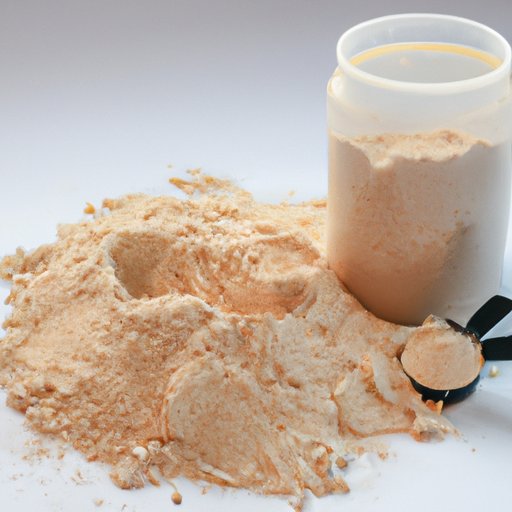Introduction
Protein powder is a dietary supplement made from various sources of protein, such as whey, casein, soy, egg white, or hemp. It’s often used by athletes, bodybuilders, and those looking to gain muscle mass or lose weight. But is protein powder healthy? In this article, we’ll explore the potential benefits and risks associated with using protein powder, so you can make an informed decision about whether or not it’s right for you.
Examining the Benefits of Protein Powder: Is it a Healthy Option?
Protein powder is typically high in nutritional value, as it’s packed with essential amino acids, vitamins, and minerals. According to a study in the journal Nutrients, “The majority of commercially available protein powders contain high quality proteins and are nutritionally complete.”
In addition to providing essential nutrients, protein powder may also offer certain health benefits. For example, research suggests that increasing your protein intake may help reduce hunger and promote weight loss. A study published in the American Journal of Clinical Nutrition found that “increasing dietary protein content is effective in reducing body weight and fat mass.”
Exploring Different Types of Protein Powder and Their Potential Health Impacts
There are several different types of protein powder available on the market, each with its own set of pros and cons. Whey protein is one of the most popular types of protein powder, as it’s high in essential amino acids and has been shown to support muscle growth. However, it’s not suitable for people with lactose intolerance, as it contains milk products.
Casein protein is another type of protein powder that is derived from milk. It’s slower to digest than whey protein, making it better suited for sustained energy release. However, like whey protein, it’s not suitable for those with lactose intolerance.
Soy protein is a plant-based alternative to whey and casein protein, making it suitable for vegans and those who are lactose intolerant. It’s also high in essential amino acids and has been linked to improved heart health. However, some research suggests that consuming large amounts of soy protein may increase the risk of certain cancers.
Egg white protein is another plant-based protein powder option. It’s high in essential amino acids and is free of cholesterol. However, it’s not suitable for people with egg allergies.
Finally, hemp protein is a vegan-friendly option that offers a good source of essential fatty acids and fiber. However, it’s lower in essential amino acids than other types of protein powder.
Pros and Cons of Protein Powder: Is It Good for Your Health?
Overall, protein powder can be a beneficial addition to your diet if used correctly. It can help meet your daily protein requirements, which are necessary for muscle growth and repair, as well as overall health. Additionally, it can provide a convenient way to get essential nutrients, especially if you’re unable to get enough through your regular diet.
However, there are also potential risks associated with using protein powder. If you consume too much protein, you may put yourself at risk for kidney damage, liver problems, dehydration, and other health issues. Additionally, many types of protein powder contain artificial sweeteners, preservatives, and other additives that may be unhealthy if consumed in large amounts.
How Much Protein Should You Be Getting and Is Protein Powder a Good Source?
The amount of protein you need depends on your age, activity level, and other factors. The recommended daily intake of protein is 0.8 grams per kilogram of body weight, according to the World Health Organization. However, athletes and bodybuilders may have higher protein needs.
Protein powder can be a good source of protein, but it’s important to read labels and choose products that are low in sugar and artificial ingredients. Additionally, it’s best to get most of your protein from whole food sources, such as lean meats, fish, eggs, legumes, nuts, and seeds.
Unpacking the Myths and Facts About Protein Powder: Is It Good or Bad for You?
There are many myths surrounding the use of protein powder, including that it’s bad for your kidneys and can cause hair loss. However, many of these claims are unfounded. While excessive protein intake may put you at risk for kidney and liver damage, moderate amounts are unlikely to cause any harm.
It’s also important to note that protein powder won’t cause hair loss, as hair loss is usually caused by other factors, such as genetics, hormones, stress, and lifestyle choices. Additionally, protein powder isn’t a “miracle” solution for gaining muscle; it should be part of a balanced diet and exercise program.
Conclusion
Protein powder can be a beneficial addition to your diet if used correctly. It provides essential nutrients and may help build muscle and promote weight loss. However, it’s important to be aware of the potential risks associated with excessive protein intake and to choose protein powder products that are low in sugar and artificial ingredients. Ultimately, it’s best to get most of your protein from whole food sources and to speak with your doctor before making any major changes to your diet.
(Note: Is this article not meeting your expectations? Do you have knowledge or insights to share? Unlock new opportunities and expand your reach by joining our authors team. Click Registration to join us and share your expertise with our readers.)
